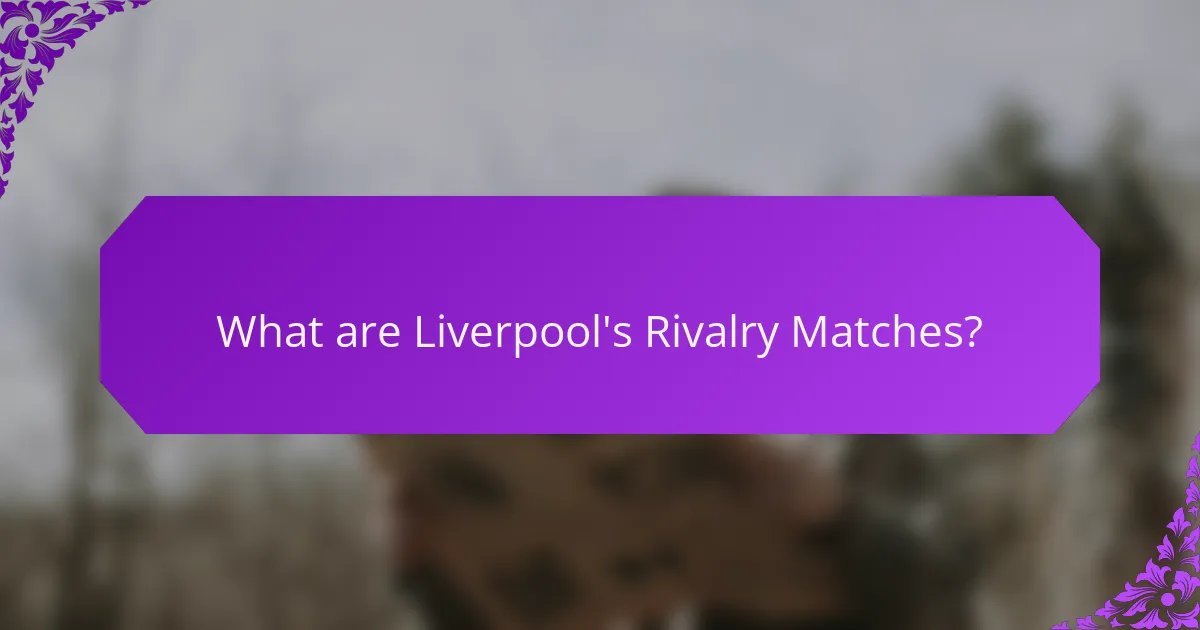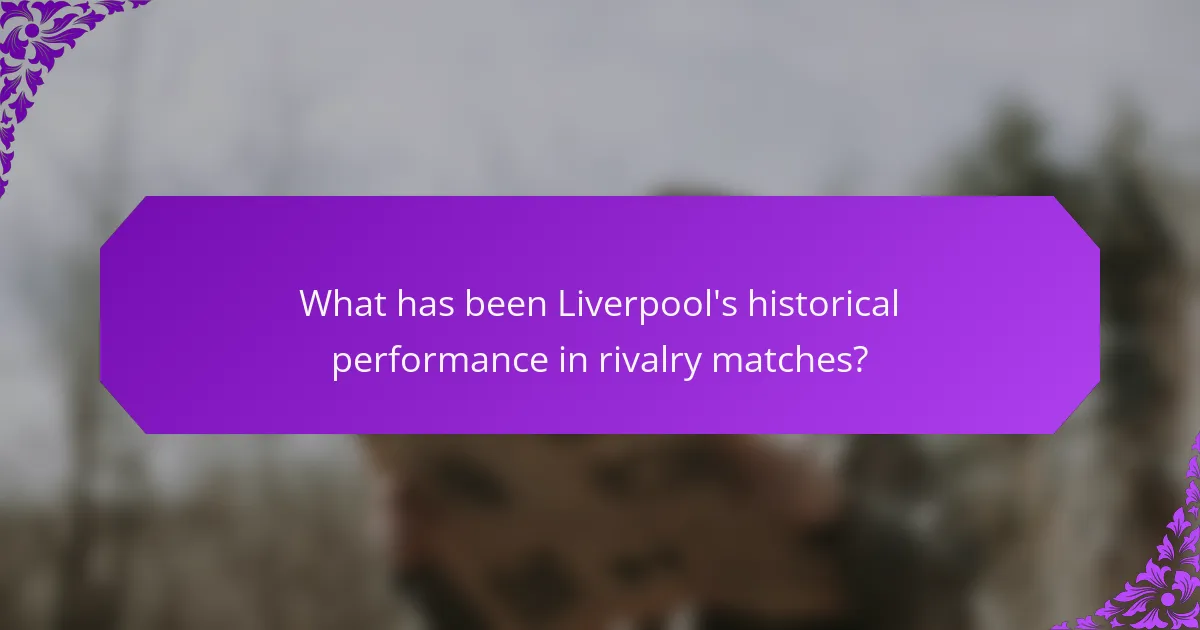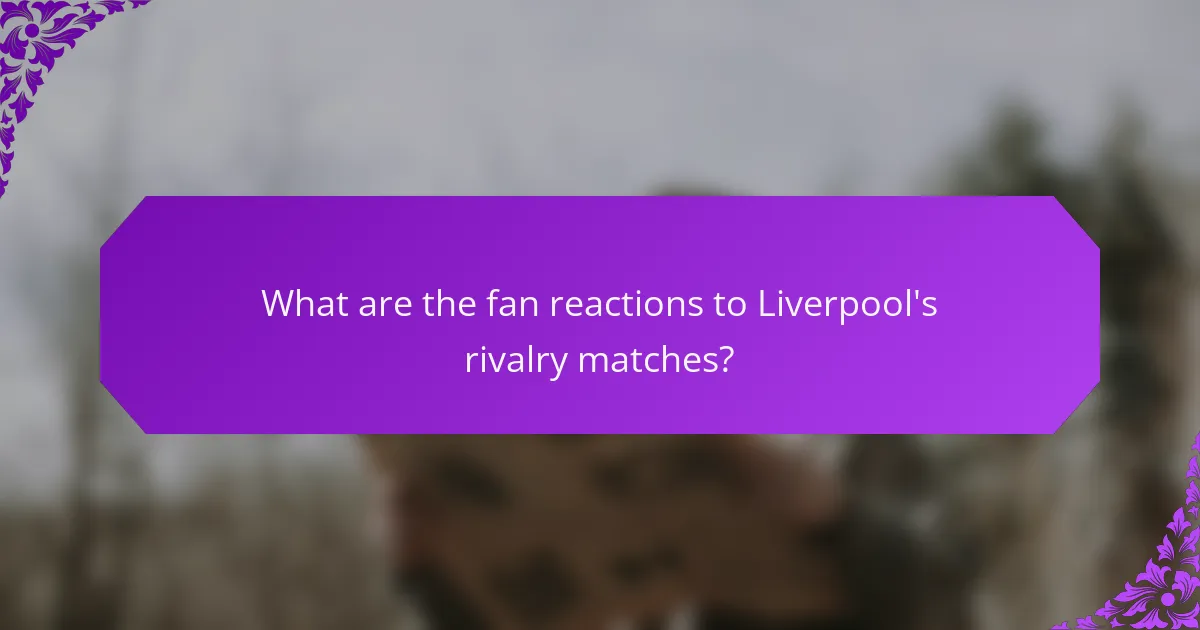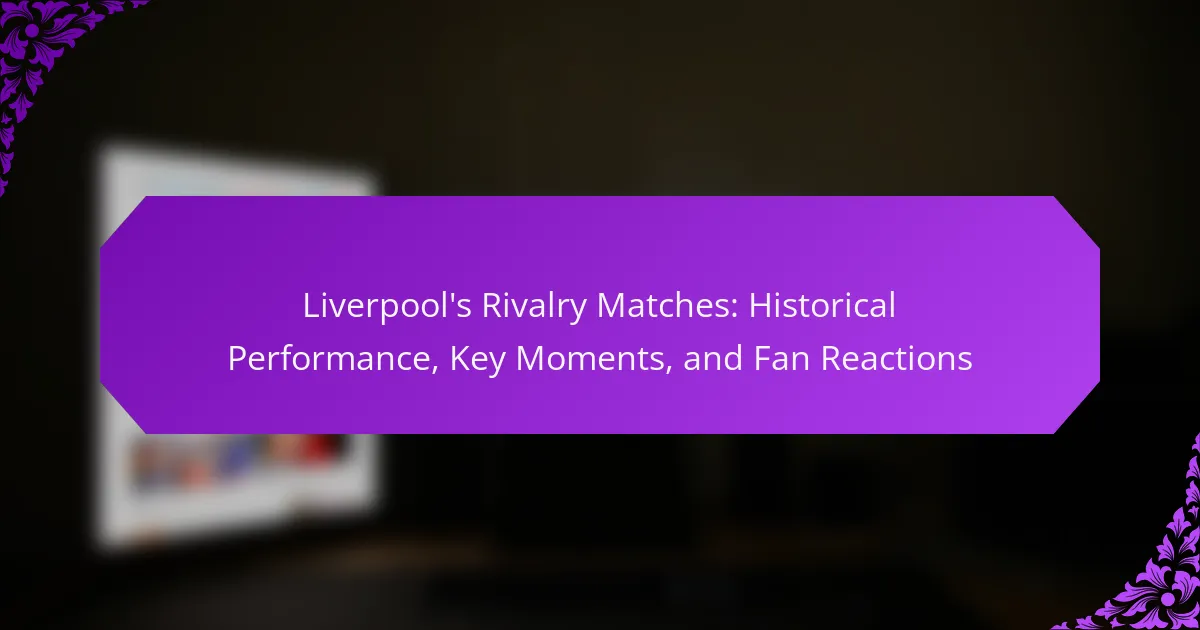Liverpool’s rivalry matches are significant contests against key opponents, including Manchester United, Everton, and Chelsea. The rivalry with Manchester United is particularly intense, rooted in historical competition for titles and regional pride, while the Merseyside derby against Everton showcases local rivalry and passionate fan engagement. Matches against Chelsea have gained prominence since the mid-2000s, marked by crucial encounters in various competitions. These rivalries not only shape the club’s identity but also foster a strong sense of community and pride among fans, whose unwavering support plays a vital role in the team’s performance, especially during high-stakes matches.

What are Liverpool’s Rivalry Matches?
Liverpool’s rivalry matches primarily include contests against Manchester United, Everton, and Chelsea. The match against Manchester United is known as one of the fiercest rivalries in English football. This rivalry is rooted in historical competition for titles and regional pride. Everton, Liverpool’s local rival, is involved in the Merseyside derby, which is noted for its passionate fan base. Matches against Chelsea have intensified since the mid-2000s, marked by key encounters in domestic and European competitions. These rivalries are characterized by intense atmospheres and significant implications for league standings. Overall, Liverpool’s rivalry matches play a crucial role in the club’s identity and history.
How did Liverpool’s rivalry matches originate?
Liverpool’s rivalry matches originated from historical and geographical factors. The club’s most notable rival is Manchester United, with their rivalry beginning in the late 19th century. This rivalry intensified due to both clubs’ success and proximity, as they are only 35 miles apart. Another significant rivalry is with Everton, rooted in the shared history of both clubs in Liverpool. They have competed in local derbies since Everton’s formation in 1878. The fierce competition is fueled by fan passion and regional pride. Over the years, these matches have become emblematic of English football culture.
What historical events contributed to the formation of these rivalries?
The formation of Liverpool’s rivalries is rooted in several historical events. The founding of Liverpool Football Club in 1892 marked the beginning of competitive local rivalries. The club’s split from Everton led to a deep-seated competition between the two teams. In the 1960s and 1970s, Liverpool’s dominance in English football intensified rivalries with clubs like Manchester United. The 1980s saw intense competition with Everton, particularly during the Merseyside derbies. Additionally, Liverpool’s European successes in the 1970s and 1980s fueled rivalries with clubs across Europe, such as Borussia Mönchengladbach. The Hillsborough disaster in 1989 also impacted rivalries, as it brought attention to fan culture and safety issues. These events collectively shaped the intense rivalries that Liverpool experiences today.
How have Liverpool’s rivalries evolved over the years?
Liverpool’s rivalries have evolved significantly over the years. Initially, rivalries were primarily local, focusing on teams like Everton, known as the Merseyside Derby. This derby has deep historical roots, dating back to 1892. As Liverpool became more successful, rivalries expanded to include clubs like Manchester United and Chelsea. The rivalry with Manchester United intensified in the 1990s, fueled by both teams’ dominance in English football. The competition for titles and European success has further heightened tensions. Additionally, the emergence of clubs like Manchester City has added new dimensions to Liverpool’s rivalries. The nature of these rivalries has shifted from local to national and international perspectives. Overall, Liverpool’s rivalries reflect changes in football culture, competition levels, and team performances.
Who are Liverpool’s main rivals?
Liverpool’s main rivals are Manchester United, Everton, and Chelsea. Manchester United rivalry is rooted in historic competition for titles. The matches between Liverpool and Manchester United are among the most watched globally. Everton, known as the Merseyside derby, features intense local rivalry. This rivalry has existed since the late 19th century. Chelsea has emerged as a significant rival in recent decades. Matches against Chelsea often have implications for league standings and cup competitions. These rivalries contribute to Liverpool’s rich football history and fan culture.
What characteristics define Liverpool’s rivalries with Manchester United?
Liverpool’s rivalries with Manchester United are defined by historical significance, regional pride, and competitive intensity. The rivalry stems from both clubs’ success in English football. Liverpool has won 19 league titles, while Manchester United has 20. This competitive edge fuels passionate encounters between the teams.
The matches often evoke strong emotions among fans. The rivalry is marked by intense atmospheres during games, with supporters displaying fervent loyalty. Historical events, such as the Heysel Stadium disaster in 1985, have also shaped the rivalry.
Additionally, both clubs have a rich tradition of developing world-class players. This has led to memorable moments that define their encounters. Matches between Liverpool and Manchester United are often seen as the pinnacle of English football rivalries. The significance of these games extends beyond the pitch, reflecting social and cultural dynamics between the cities.
How does the rivalry with Everton differ from others?
The rivalry with Everton is unique due to its geographical proximity, known as the Merseyside Derby. This rivalry is characterized by a shared city, which intensifies local pride and competition. Unlike other rivalries, it features clubs from the same community. Historical context shows that both clubs have a long-standing relationship, dating back to 1892. The Merseyside Derby is often seen as a celebration of local football culture. Furthermore, the atmosphere is distinct, with families often divided between the two clubs. This rivalry has a lower incidence of violence compared to others in England. Overall, the Everton rivalry emphasizes community ties more than competitive animosity.
What significance do rivalry matches hold for Liverpool FC?
Rivalry matches hold immense significance for Liverpool FC. They foster a deep sense of identity and pride among players and fans. These matches are often seen as crucial for local bragging rights. Historical rivalries, particularly with Manchester United and Everton, enhance competitive spirit. The outcomes of these matches can impact league standings and cup progress. Rivalry games draw significant media attention and fan engagement. Liverpool has a storied history in these encounters, often leading to memorable moments. The passion surrounding these matches strengthens community ties and club loyalty.
How do these matches impact the club’s identity?
Rivalry matches significantly shape Liverpool’s club identity. These matches foster a strong sense of community among fans. They create emotional connections that transcend generations. The team’s historical performances in these rivalries contribute to its legacy. Notable victories and defeats become part of the club’s narrative. For instance, the intense rivalry with Manchester United amplifies the club’s competitive spirit. Additionally, fan reactions during these matches reflect loyalty and passion. This collective experience reinforces Liverpool’s identity as a formidable football club.
What role do rivalries play in Liverpool’s fan culture?

What has been Liverpool’s historical performance in rivalry matches?
Rivalries play a significant role in Liverpool’s fan culture. They foster a deep sense of identity and community among supporters. Matches against rivals, particularly Manchester United and Everton, evoke intense emotions. These games are viewed as more than just fixtures; they symbolize pride and local heritage. Liverpool fans often display passionate support during these rivalries. Historical performances in these matches shape fan narratives and traditions. For instance, Liverpool has a strong record against Everton in the Merseyside derby. This success contributes to the rivalry’s intensity and the fans’ loyalty. Overall, rivalries are central to the spirit and culture of Liverpool’s fanbase.
How successful has Liverpool been against its rivals?
Liverpool has been highly successful against its rivals. Historically, Liverpool has won 19 league titles, making them one of the most successful teams in English football. They have also secured six UEFA Champions League titles, showcasing their dominance on the European stage. In head-to-head matches against key rivals like Manchester United and Everton, Liverpool has a favorable record. For instance, they have won over 70 matches against Everton in competitive fixtures. Against Manchester United, Liverpool has achieved more than 60 victories in official encounters. Overall, Liverpool’s success rate in rivalry matches underscores their status as a top club in both domestic and international competitions.
What are the win-loss records in key rivalry matches?
It is not possible to provide a specific answer without the exact rivalry matches being referenced. Key rivalry matches can include various teams, and their win-loss records differ accordingly. For example, Liverpool’s rivalry with Manchester United has historically seen Manchester United leading with 81 wins to Liverpool’s 70 wins. In contrast, the Merseyside derby against Everton has Liverpool leading with 124 wins to Everton’s 82 wins. Specific records can vary by season and competition.
How do historical performances compare across different eras?
Historical performances in Liverpool’s rivalry matches vary significantly across different eras. In the early 20th century, Liverpool dominated local rivals, winning numerous league titles. The club’s performance peaked in the 1970s and 1980s, where it secured multiple European trophies and domestic titles. The 1990s saw a decline, with fewer major honors compared to previous decades.
In recent years, Liverpool has regained prominence, winning the UEFA Champions League in 2019 and the Premier League in 2020. Statistical analyses show that Liverpool’s win rate against rivals like Manchester United and Everton fluctuated, reflecting changes in team strength and management. For instance, Liverpool’s win rate against Manchester United was approximately 45% in the 1990s, which improved to around 60% in the late 2010s.
Overall, historical performances illustrate Liverpool’s fluctuating dominance, influenced by changes in player quality, management, and competitive dynamics.
What memorable matches have defined Liverpool’s rivalries?
Memorable matches that have defined Liverpool’s rivalries include several iconic encounters. One key match is the 1989 FA Cup final against Everton, where Liverpool won 3-2. This match intensified the Merseyside rivalry. Another significant clash occurred in 2005, when Liverpool faced AC Milan in the UEFA Champions League final. Liverpool came back from a 3-0 halftime deficit to win on penalties. The 2014 match against Chelsea is also notable, where Liverpool’s title hopes were dashed after a 2-0 loss. Additionally, the 2017 match against Manchester United ended in a 1-1 draw, showcasing the fierce competition between the two clubs. Each of these matches has left a lasting impact on Liverpool’s rivalries.
What were the key moments in the Liverpool vs. Manchester United rivalry?
The key moments in the Liverpool vs. Manchester United rivalry include several significant matches and events. The first notable moment was the FA Cup final in 1977, where Liverpool won 2-1. This victory marked the beginning of Liverpool’s dominance in English football. Another crucial moment occurred in 1994 when Manchester United defeated Liverpool 2-1 at Wembley, showcasing United’s rise under Sir Alex Ferguson.
In 2009, Liverpool’s 4-1 victory at Old Trafford was a landmark win, highlighting their competitive strength. The 2011 match, which ended in a 1-0 victory for United, was marred by controversy due to Luis Suárez’s racial abuse incident involving Patrice Evra.
In 2018, Liverpool’s 3-1 victory at Anfield demonstrated their resurgence in form. Each of these moments has contributed to the intense rivalry and historical significance between the two clubs.
How did the Merseyside Derby shape Liverpool’s history?
The Merseyside Derby significantly shaped Liverpool’s history through intense rivalry and pivotal matches. This derby, contested between Liverpool FC and Everton FC, showcases the city’s footballing passion. Historical encounters have influenced player legacies and club identities. The first derby took place in 1892, marking the beginning of a fierce competition. Key moments, such as Liverpool’s 5-0 victory in 1982, solidified their dominance. Additionally, memorable matches often drew large crowds, fostering community spirit. The derby has also produced legendary players, impacting Liverpool’s success over the years. Overall, the Merseyside Derby has been integral to Liverpool’s cultural and sporting narrative.
What factors contribute to Liverpool’s performance in rivalry matches?
Liverpool’s performance in rivalry matches is influenced by several key factors. Team morale plays a crucial role, as high spirits often lead to enhanced performance. The historical significance of rivalries, such as those with Manchester United and Everton, adds pressure and motivation. Tactical strategies employed by the coaching staff are also vital; they adapt game plans to exploit opponents’ weaknesses. Player experience in high-stakes matches contributes to composure and decision-making under pressure. Home advantage significantly impacts performance, with Anfield’s atmosphere providing a strong boost. Additionally, fan support creates an emotional environment that can uplift players. Lastly, injuries and player fitness levels directly affect team dynamics and overall performance.
How do player transfers and management changes influence results?
Player transfers and management changes significantly influence a football team’s results. Transfers can enhance a squad’s quality by introducing skilled players. For instance, Liverpool’s signing of Virgil van Dijk in 2018 improved their defensive stability, leading to a Champions League title in 2019. Conversely, losing key players can weaken a team, as seen when Liverpool lost Philippe Coutinho in 2018. Management changes can also impact results by altering tactics and team morale. A new manager may bring fresh strategies, which can lead to immediate improvements. For example, Jürgen Klopp’s appointment in 2015 transformed Liverpool’s playing style and performance, culminating in a Premier League title in 2020. Thus, both player transfers and management changes are critical factors affecting a team’s success on the pitch.
What role does fan support play in Liverpool’s performance?

What are the fan reactions to Liverpool’s rivalry matches?
Fan support plays a crucial role in Liverpool’s performance. The passionate backing from fans creates a motivating atmosphere during matches. This support can boost players’ morale and enhance their performance on the field. Historical data shows that Liverpool has a strong home advantage at Anfield, largely due to fan presence. The famous “You’ll Never Walk Alone” anthem unites fans and players, fostering a sense of camaraderie. In high-stakes rivalry matches, fan energy can significantly influence the outcome. Studies indicate that teams with strong fan support often perform better in critical games. Overall, fan support is integral to Liverpool’s success and competitive edge.
How do fans typically respond during rivalry matches?
Fans typically respond with heightened emotions during rivalry matches. They often display intense passion and enthusiasm. Chants, songs, and coordinated cheers are common. Fans may also engage in rival banter with opposing supporters. The atmosphere in stadiums is electric, filled with anticipation. Historical rivalries, like Liverpool vs. Manchester United, amplify these reactions. Statistics show increased ticket sales and attendance during these matches. Emotional investment is reflected in fan behavior, such as wearing team colors prominently.
What chants and traditions are associated with Liverpool’s rivalries?
Liverpool’s rivalries are marked by several iconic chants and traditions. One of the most famous chants is “You’ll Never Walk Alone.” This anthem is sung by fans before every home game, symbolizing unity and support. It originated from the musical “Carousel” and was adopted by Liverpool in the 1960s.
Another notable chant is “We Are the Champions,” often sung in celebration of victories against rivals. Additionally, during matches against Manchester United, fans frequently chant “United are rubbish,” showcasing the competitive spirit.
Traditions include the “Shankly Gates” tribute, where fans gather to honor club legend Bill Shankly before key matches. The atmosphere in Anfield during derbies, especially against Everton, is electric, with fans creating a sea of red flags and scarves.
These chants and traditions enhance the rivalry experience and foster a sense of belonging among supporters.
How does fan behavior vary between home and away matches?
Fan behavior significantly differs between home and away matches. At home matches, fans exhibit heightened enthusiasm and support for their team. They create a vibrant atmosphere through chants, songs, and coordinated displays. Statistics show that home teams often enjoy a psychological advantage due to this intense support. Conversely, away matches often see fans displaying a sense of solidarity and resilience. They may engage in traveling to support their team despite potential hostility from opposing fans. Research indicates that away fans often feel a stronger bond with each other during these matches. This dynamic can lead to increased vocal support, even in challenging environments. The difference in behavior is also influenced by the familiarity of the home ground compared to the unpredictability of away venues.
What emotional impact do rivalry matches have on fans?
Rivalry matches have a significant emotional impact on fans. These matches evoke intense feelings of passion and loyalty. Fans often experience heightened anxiety before and during the game. Victory in a rivalry match can lead to euphoria and a sense of pride. Conversely, a loss can result in disappointment and frustration. Historical statistics show that fans report increased heart rates and stress levels during these games. Studies indicate that rivalry matches can strengthen community bonds among supporters. The emotional stakes are particularly high in matches like Liverpool vs. Manchester United, where the rivalry is deeply rooted in history.
How do wins and losses influence fan morale?
Wins and losses significantly influence fan morale. Victories typically boost fan enthusiasm and pride. Fans often celebrate wins with communal gatherings and social media engagement. High morale can lead to increased support for the team. Conversely, losses can result in disappointment and frustration among fans. Negative outcomes may lead to decreased attendance at matches. Research shows that consistent winning teams enjoy stronger fan loyalty. For instance, during Liverpool’s successful seasons, fan engagement metrics increased substantially.
What stories illustrate the passion of Liverpool fans during rivalries?
Liverpool fans demonstrate immense passion during rivalries, particularly against Manchester United and Everton. One notable story is the 1986 FA Cup final. Liverpool faced Everton in a highly anticipated match. The atmosphere was electric, with fans creating a vibrant display of support. Liverpool won the match 3-1, showcasing their dominance and the intense rivalry. Another example is the Hillsborough disaster in 1989. Liverpool fans showed solidarity and resilience in the aftermath. They fought for justice for the 96 victims, uniting the fanbase and highlighting their deep connection to the club. These stories illustrate the unwavering passion and loyalty of Liverpool fans during rivalries.
What can fans do to enhance their experience during rivalry matches?
Fans can enhance their experience during rivalry matches by actively participating in the atmosphere. Engaging in chants and songs creates a sense of unity among supporters. Wearing team colors and merchandise visibly shows loyalty and pride. Arriving early allows fans to soak in the pre-match excitement. Interacting with fellow fans fosters a community spirit. Attending fan events or gatherings builds anticipation and camaraderie. Utilizing social media to share experiences amplifies the excitement beyond the stadium. Following these practices can significantly enrich the overall matchday experience.
What are the best practices for attending a Liverpool rivalry match?
Arrive early to secure a good spot and soak in the atmosphere. Familiarize yourself with the stadium layout and entry points. Wear your team’s colors to show support and unity. Respect rival fans and avoid confrontational behavior. Stay hydrated and consume food before the match. Follow security regulations and carry only necessary items. Use public transport to avoid parking hassles. Keep your ticket safe and accessible for entry.
How can fans engage positively with rival supporters?
Fans can engage positively with rival supporters by promoting mutual respect and understanding. They can share experiences and stories about their teams, fostering a sense of camaraderie. Attending matches together can create a friendly atmosphere. Fans can also participate in charity events that involve both supporter groups. This promotes goodwill and highlights shared interests beyond the rivalry. Engaging in friendly banter, rather than hostility, can enhance interactions. Additionally, social media platforms can be used to celebrate each other’s achievements. This encourages a positive dialogue and strengthens community ties among supporters.
Liverpool FC’s rivalry matches are characterized by intense competition against key opponents such as Manchester United, Everton, and Chelsea. These rivalries have historical roots and significant implications for league standings, with notable events shaping their evolution over the years. The article explores the origins of these rivalries, key moments that defined them, and the emotional impact on fans, highlighting Liverpool’s historical performance and the role of fan culture in these encounters. Additionally, it examines how wins and losses influence fan morale and the ways fans can enhance their experience during rivalry matches.
